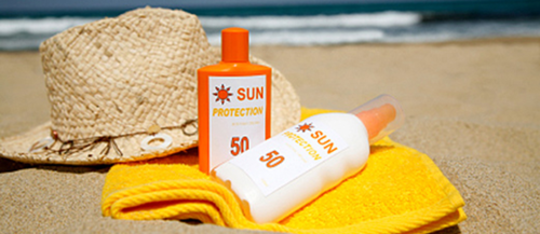What to Look for in Selecting A Sunscreen

July 11, 2017
by Mankato Clinic
At least half of us don’t put on the recommended amount of sunscreen, which can lead to harmful effects of sun exposure and skin cancer. One in five Americans will develop some form of skin cancer in their lifetime, which is why donning sunscreen is one of the best things we can do for our largest organ.
Whether it’s January or July, it’s important to get into the habit of applying a 30 sun protection factor (SPF) sunscreen multiple times a day. Dermatologists recommend that you use a shot glass, or one ounce, of sunscreen lotion to cover your entire body.
When selecting a sunscreen, look for a broad band coverage, or one that protects against ultraviolet (UV) A and B rays. Protecting against UV-A rays will slow down the look of aging, while protecting yourself against UV-B rays will help to combat sun burns. Products that aren’t labeled broad spectrum will carry a warning that they only protect against sunburn, not skin cancer or skin aging.
In addition, remember that water resistant, does not mean waterproof when it comes to sunscreen. To get the most protection, reapply sunscreen at least every two hours, or more often, if you are sweating or swimming. Keep in mind that sunscreen typically wears off when you dry yourself, so you may need to apply more.
Seek your dermatology provider for routine skin exams to help better understand your skin and receive guidance of any questions or concerns you may have.
Read on for tips on how to protect your skin this summer:
- Apply sunscreen at least 15-30 minutes before you head outside. A good rule of thumb is to put on enough lotion that it takes a full minute to rub in.
- If you’re headed to the beach or going swimming, spread at least one ounce (about one shot-glass full) on your face and body.
- Stay away from the sun in the middle of day (10 a.m. to 4 p.m.).
- Block the sun with protective clothing and seek shade whenever possible. There are many companies that now make swim shirts, wraps and hats that promise a UV Protection Factor (UPF) of SPF 50 or higher.
- Wear a pair of UV protective sunglasses to protect the eyes and prevent squinting (for fewer wrinkles)!